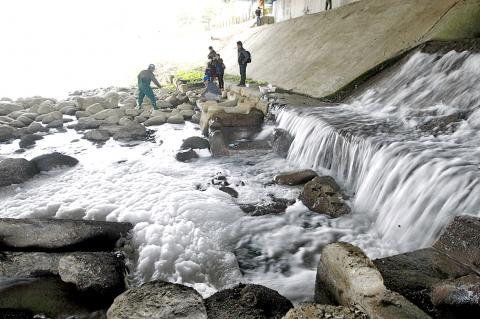The Taiwan High Court’s Kaohsiung branch yesterday reversed a lower court verdict, finding all five defendants in a 2013 pollution case involving Advanced Semiconductor Engineering Inc (ASE, 日月光半導體) not guilty on various charges related to discharging wastewater from the company’s K7 plant into the Houjing River (後勁溪).
The court acquitted four ASE executives and employees of all charges, including K7 plant general manager Su Ping-shou (蘇炳碩), plant wastewater section director Tsai Chi-hsun (蔡奇勳) and two wastewater section engineers — Yu Chih-hsien (游志賢) and Liu Wei-cheng (劉威呈).
Yesterday’s second ruling in the ongoing trial also cleared ASE of charges, meaning the company does not have to pay a NT$3 million (US$90,901) fine imposed by the Kaohsiung District Court in the first ruling on Oct. 20 last year.

Photo: Chang Chung-yi, Taipei Times
In the first ruling, the court found the four defendants guilty, but gave suspended sentences ranging from 16 months to 22 months, related to breaches of the Waste Disposal Act (廢棄物清理法).
Prosecutors appealed to the higher court at that time, saying the punishments were too lenient, as suspended sentences meant none of the defendants had to serve jail terms.
Another ASE K7 plant engineer, Ho Teng-yang (何登陽), who was found not guilty in last year’s ruling, had his verdict upheld by the high court.
ASE, said to be world’s largest IC packaging company, was accused of dumping industrial wastewater containing carcinogenic compounds and other toxic substances in the Houjing River after reports of discoloration and suspected pollution in October 2013.
Yesterday’s ruling was based on the judge’s belief that ASE had treated the wastewater and waste sludge differently, and that if any violations had occurred, they would be of the Water Pollution Control Act (水污染防治法).
The wastewater in question was not “hazardous industrial waste,” so the first ruling was wrong to have cited violations of the Waste Disposal Act (廢棄物清理法), yesterday’s ruling said.
The ruling said that Water Pollution Control Act laws regarding the discharge of toxic wastewater by businesses were only amended in February, and therefore a punishment cannot be meted out for a case from 2013.
The ruling also said that ASE employees had added extra amounts of alkaline liquid into wastewater to neutralize its acidity on the day pollution levels were recorded (Oct. 1, 2013), with pH levels shown to have returned to legal discharge standards by 8pm that night.
“Although there were shortcomings on that day’s processing and treatment of wastewater, it was not done deliberately, nor was it done in a haphazard way... Therefore, there were flaws in the first ruling,” it said.
It also said that prosecutors provided only one fish specimen and one sample from the riverbed as evidence of pollution, without presenting samples from other locations, or samples from preceding and subsequent times for comparison, adding that as reasonable doubt remains, the defendants should be acquitted of the charges.
The Kaohsiung District Prosecutors’ Office said it would decide whether to appeal the case after reviewing the ruling.

Intelligence agents have recorded 510,000 instances of “controversial information” being spread online by the Chinese Communist Party (CCP) so far this year, the National Security Bureau (NSB) said in a report yesterday, as it warned of artificial intelligence (AI) being employed to generate destabilizing misinformation. The bureau submitted a written report to the Legislative Yuan in preparation for National Security Bureau Director-General Tsai Ming-yen’s (蔡明彥) appearance before the Foreign Affairs and National Defense Committee today. The CCP has been using cognitive warfare to divide Taiwanese society by commenting on controversial issues such as Taiwan Semiconductor Manufacturing Co’s (TSMC, 台積電) investments in the

HELPING HAND: The steering committee of the National Stabilization Fund is expected to hold a meeting to discuss how and when to utilize the fund to help buffer the sell-off The TAIEX plunged 2,065.87 points, or 9.7 percent, to close at 19,232.35 yesterday, the highest single-day percentage loss on record, as investors braced for US President Donald Trump’s tariffs after an extended holiday weekend. Amid the pessimistic atmosphere, 945 listed companies led by large-cap stocks — including Taiwan Semiconductor Manufacturing Co (TSMC, 台積電), Hon Hai Precision Industry Co (鴻海精密) and Largan Precision Co (大立光) — fell by the daily maximum of 10 percent at the close, Taiwan Stock Exchange data showed. The number of listed companies ending limit-down set a new record, the exchange said. The TAIEX plunged by daily maxiumu in just

INVESTIGATION: The case is the latest instance of a DPP figure being implicated in an espionage network accused of allegedly leaking information to Chinese intelligence Democratic Progressive Party (DPP) member Ho Jen-chieh (何仁傑) was detained and held incommunicado yesterday on suspicion of spying for China during his tenure as assistant to then-minister of foreign affairs Joseph Wu (吳釗燮). The Taipei District Prosecutors’ Office said Ho was implicated during its investigation into alleged spying activities by former Presidential Office consultant Wu Shang-yu (吳尚雨). Prosecutors said there is reason to believe Ho breached the National Security Act (國家安全法) by leaking classified Ministry of Foreign Affairs information to Chinese intelligence. Following interrogation, prosecutors petitioned the Taipei District Court to detain Ho, citing concerns over potential collusion or tampering of evidence. The

‘COMPREHENSIVE PLAN’: Lin Chia-lung said that the government was ready to talk about a variety of issues, including investment in and purchases from the US The National Stabilization Fund (NSF) yesterday announced that it would step in to staunch stock market losses for the ninth time in the nation’s history. An NSF board meeting, originally scheduled for Monday next week, was moved to yesterday after stocks plummeted in the wake of US President Donald Trump’s announcement of 32 percent tariffs on Taiwan on Wednesday last week. Board members voted to support the stock market with the NT$500 billion (US$15.15 billion) fund, with injections of funds to begin as soon as today. The NSF in 2000 injected NT$120 billion to stabilize stocks, the most ever. The lowest amount it